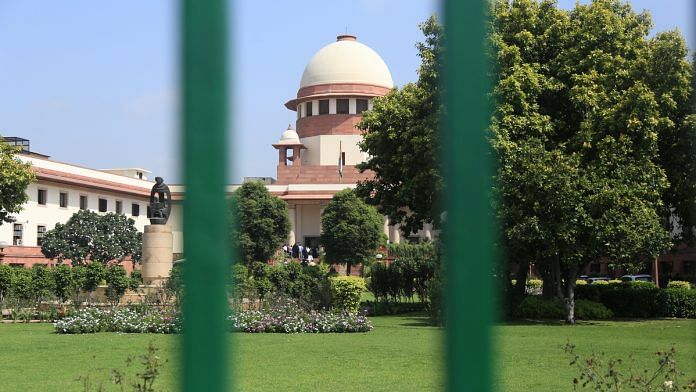New Delhi: The Modi government commenced its arguments in the Supreme Court Thursday in the case challenging the abrogation of Article 370. The government defended the 2019 move, saying that the notion that Jammu and Kashmir had a special status from the beginning is incorrect.
Solicitor general Tushar Mehta, who opened arguments for the central government on the tenth day of the hearings, said that the draft accession agreement was same for all princely states.
“All these states, which became part of India and signed the instrument of accession, had some different wording like taxes will be with the state etc, which changed over time and became one federal unit. These states voluntarily joined in the process of Constitution-making,” Mehta told the five-judge bench led by Chief Justice of India DY Chandrachud.
The solicitor general invoked Jawaharlal Nehru, saying that the first Prime Minister had “clearly stated that no princely state could prevail militarily against the army of independent India”.
Mehta noted that just a few weeks before becoming the vice-president of the interim government, Nehru had “clearly said that independent India would not accept the divine right of kings” of princely states acceding to India.
The abrogation of Article 370 resulted in the revocation of the special status of J&K and subsequent bifurcation of the erstwhile State into two Union Territories.
Mehta argued the nullification of the provision ended a “psychological duality” prevailing in the region and this enabled a large number of people to avail of their fundamental rights.
“They will be at par with other brothers and sisters of the country. Because of the ongoing confusion whether Article 370 is temporary or not, there was psychological duality in the minds of residents of Jammu and Kashmir and this was taken away from the interests not inimical to India,” he submitted.
Also Read: How Jammu & Kashmir agreed to become a part of India
‘Not a privilege that could not have been taken away’
Giving a historical background to India becoming a sovereign Republic, Mehta said that every princely state had then been allowed to put their own terms and conditions in the respective instrument of accession with Article 1.
The CJI pointed out that this move was to give a sense of confidence to the princely states.
To this, Mehta asserted Article 370 was meant to be temporary. With the signing of the treaty of accession to India, the sovereignty of the erstwhile state of J&K was subsumed by the bigger sovereign, which is the Union of India.
“Jinnah had called Pandit Nehru to Pakistan to discuss the Kashmir problem. Lord Mountbatten, Nehru, and Sardar Vallabhbhai Patel were called to Birla House to meet Gandhiji as Sardar Patel was against going to meet the aggressor and Lord Mountbatten was inclined. Later it was revealed that since Nehru was running a high fever, he could not go and thus only Mountbatten was to go,” Mehta pointed out.
He added Article 370 was not “that kind of a privilege that could not have been taken away”.
This was after the CJI noted that while for J&K the Constitution contained Article 370, for other states there was no such provision and still they merged.
“They (princely states) joined by their own volition, but J&K ducked that rule and acceded to Article 370. So, you are saying the instruments of accession of various princely states have various such reservations and conditions and are consistent with section 6 of the Government of India Act adopted by Section 9 of the Indian Independence Act,” the CJI said.
(Edited by Asavari Singh)
Also Read: Centre won’t touch special provisions for Northeast, says Tushar Mehta at Article 370 hearing



